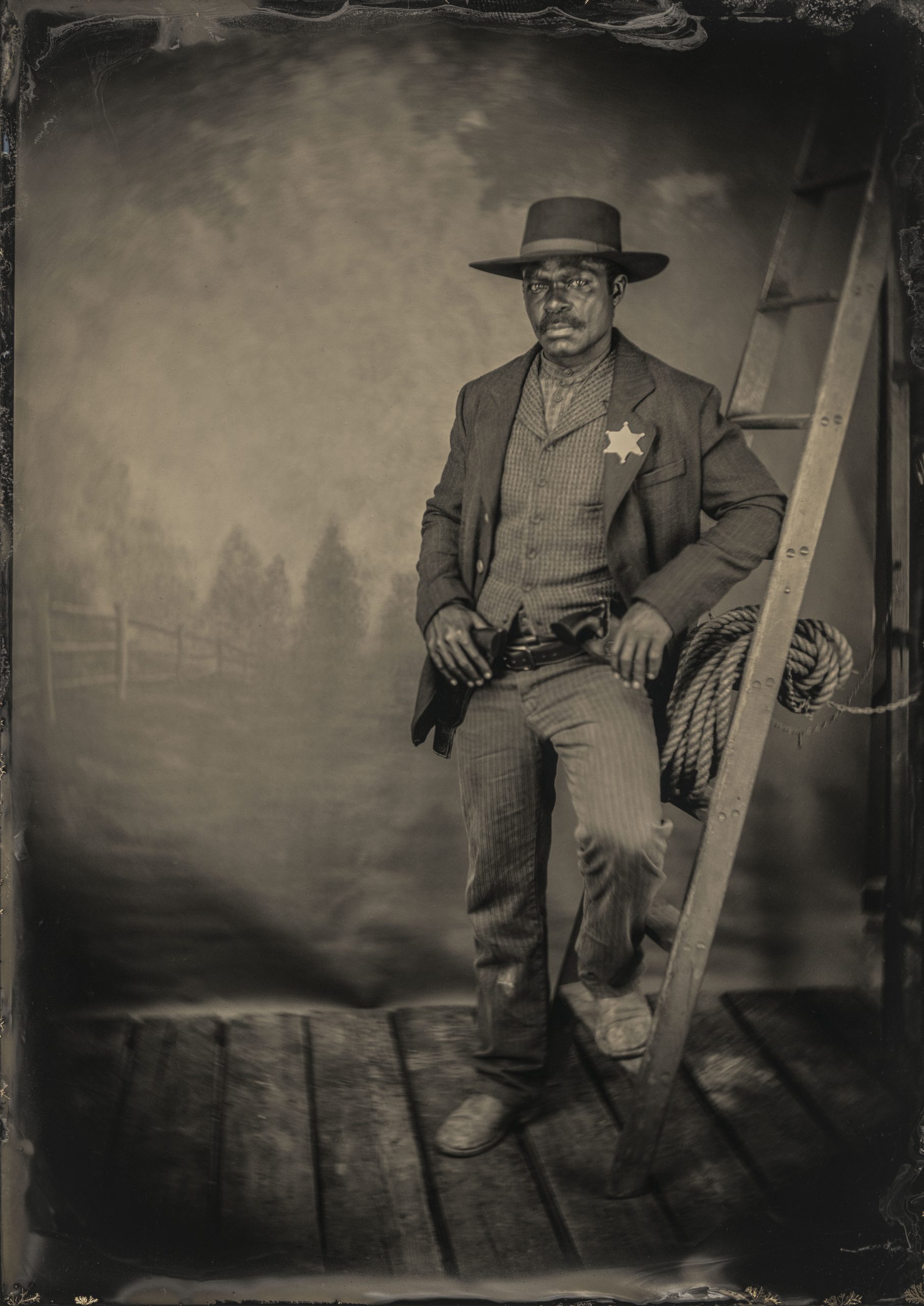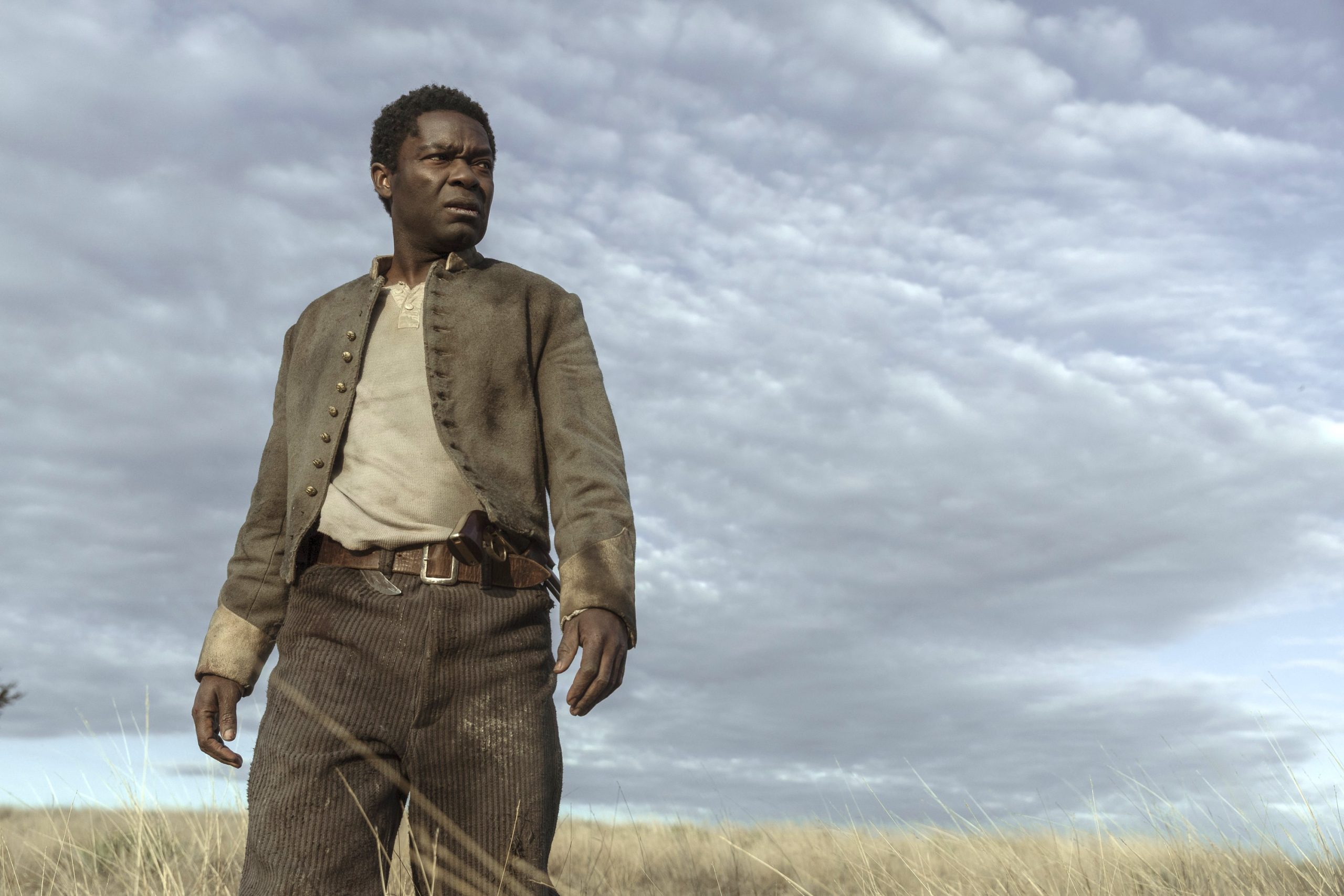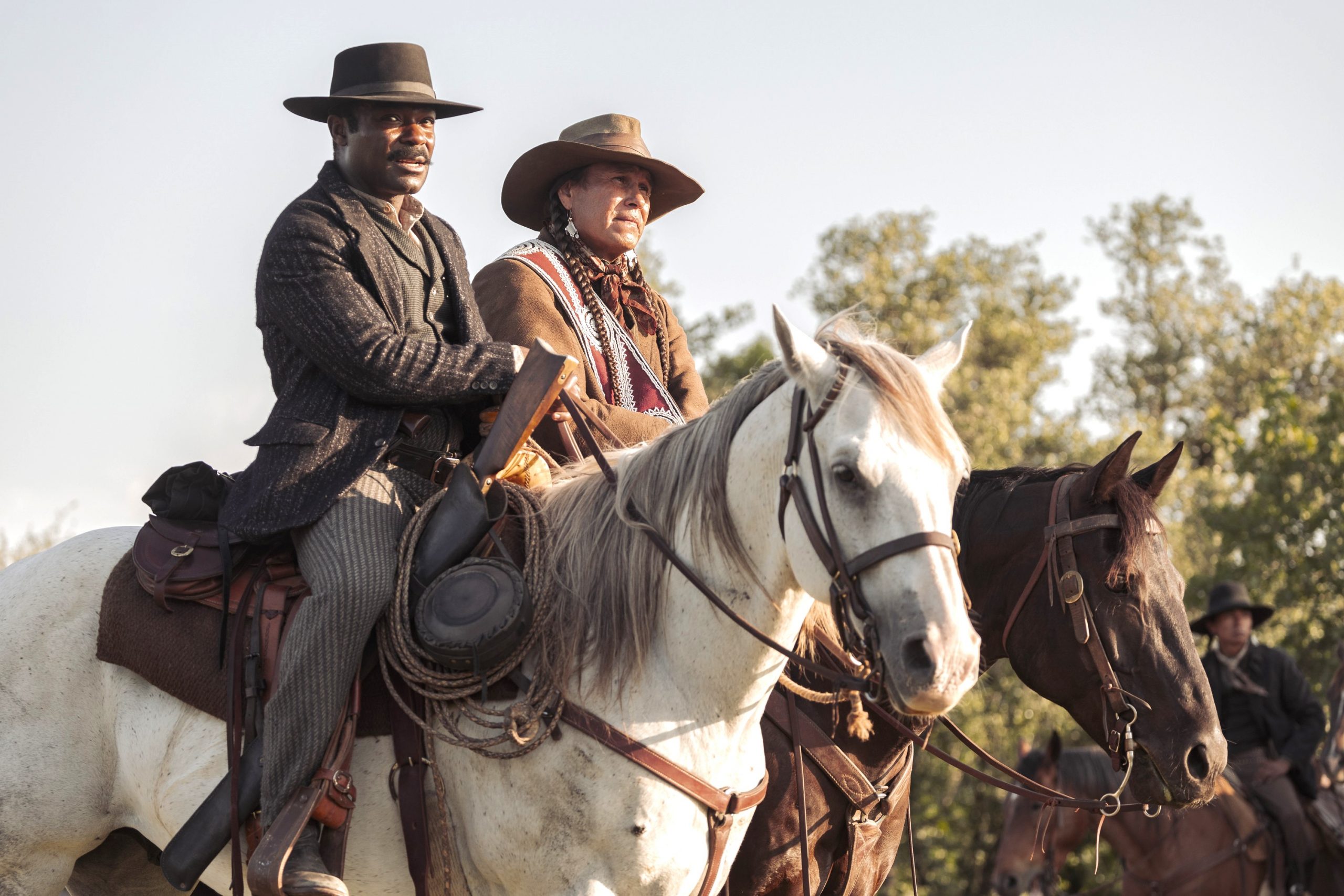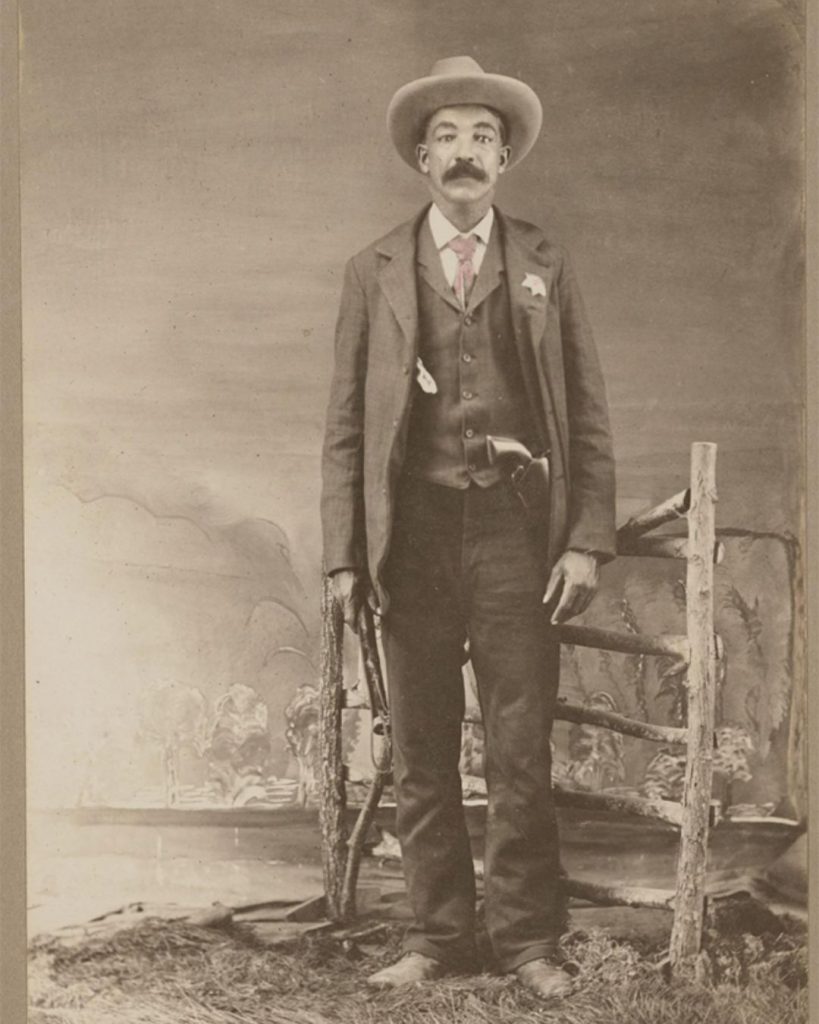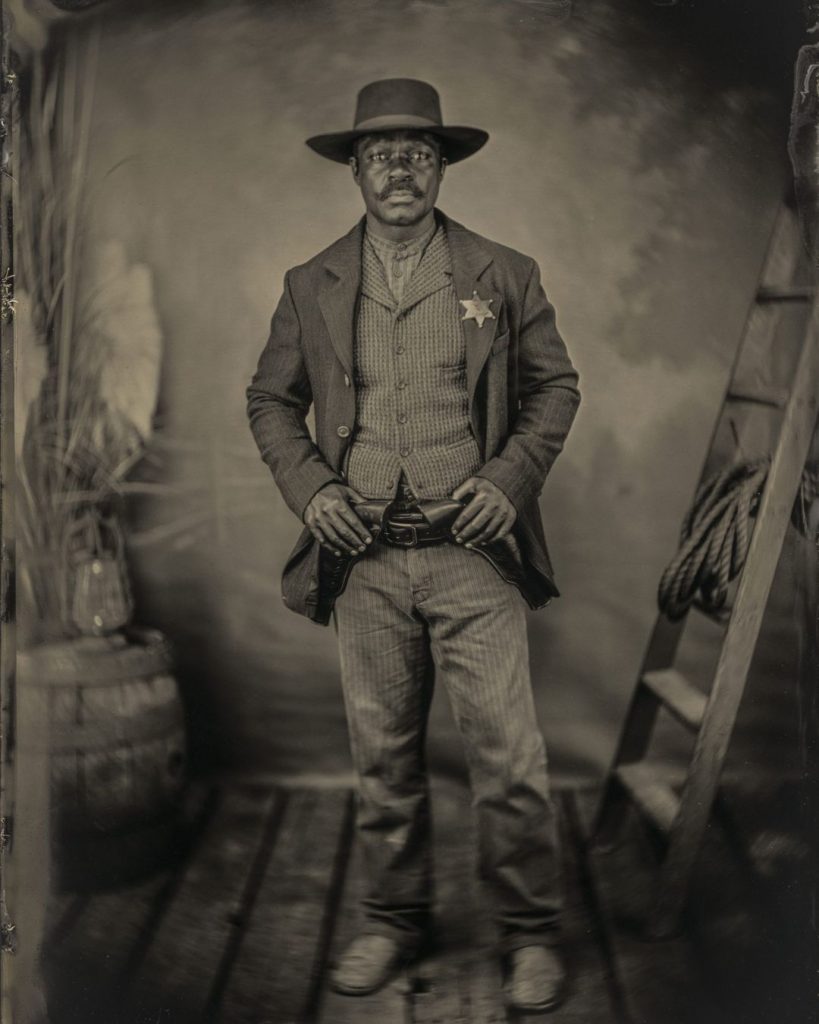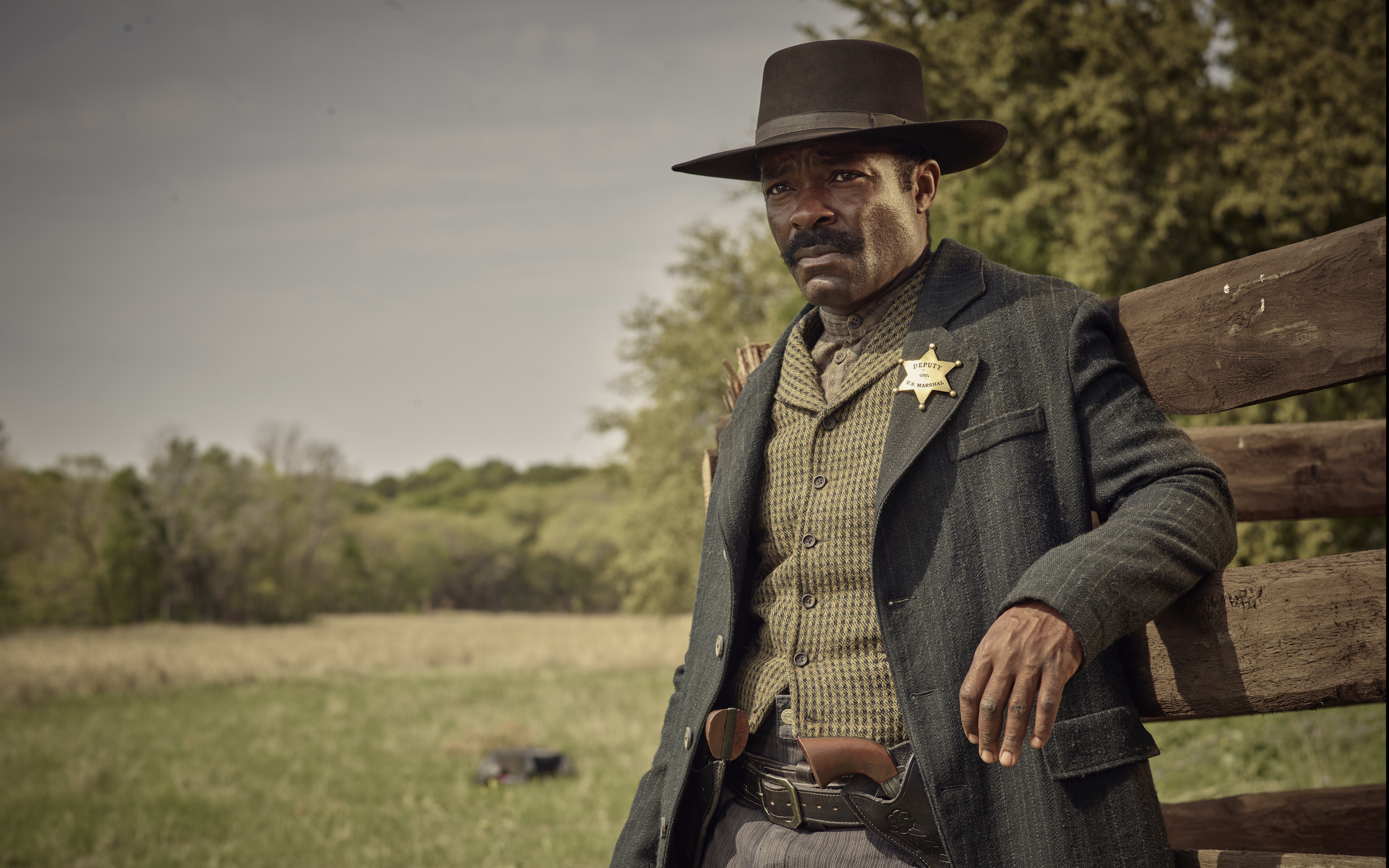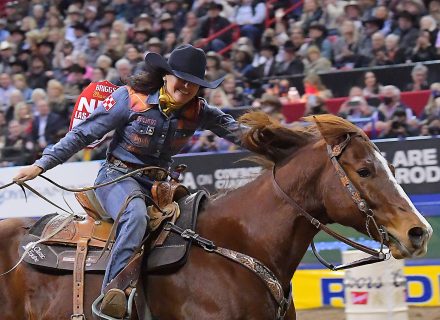Enforcing the law as the first-known Black U.S. Marshal West of the Mississippi, David Oyelowo takes the lead in the new series Lawmen: Bass Reeves.
A British-born prince of the Yoruba people of Nigeria, he might seem an unlikely actor to so convincingly inhabit quintessentially American figures on screen. But that’s how good actor David Oyelowo is. He’s already commanded the big screen brilliantly portraying Martin Luther King Jr. in Selma and is now owning the smaller screen as Old West lawman Bass Reeves in executive producer Taylor Sheridan’s new instant classic.
Oyelowo downplays the African-royalty thing — “It sounds way more impressive than it actually is. There are so many royal families in Africa,” he told The Independent — but there’s no denying he’s Hollywood royalty these days, even if he eschews the part.
As that 2013 Independent article put it — and this, on the heels of roles in Lincoln, Jack Reacher, and The Butler — “He’s descended from Nigerian royalty and was the Royal Shakespeare Company’s first Black Henry VI. Now actor David Oyelowo’s reign extends to Hollywood.” Oh, and by 2016, he’d get to tack OBE on his name, having been made an officer of the Order of the British Empire (OBE) in his native England for services to drama.
Credit Oyelowo’s upbringing with teaching him how to operate — you might say act — in vastly different worlds. Born in 1976 in Oxford, England, to Nigerian parents, he moved with his family to Lagos, Nigeria, at age 6 and went to a military-style boarding school there. Moving back to England at 16 to live in London, he grew up with his screen idols Sidney Poitier and Denzel Washington.
A devout Christian (raised Baptist) whose faith helped him understand and play Dr. King, who was an ordained Baptist minister. Moved by King’s devotion to voting rights and by the experience of portraying King during the 1965 civil rights march from Selma to Montgomery, Alabama, Oyelowo made up his mind to become an American. Now a dual citizen, he and his wife became naturalized U.S. citizens in 2016.
While his 2014 role as King in the Academy Award and Golden Globe Award-winning Selma Oyelowo was a big breakout role with American audiences, Oyelowo also turned in a breathtaking solo performance that same year in HBO’s Nightingale, the disturbingly gripping story of murderer Peter Snowden, who starts the story by confessing to the killing of his mother.
Over the last decade, Oyelowo has been nominated for more than a dozen television and film awards, taking home the Critics’ Choice Award for Best Actor in a Motion Picture for Nightingale which also earned him a Golden Globe nomination for his work as executive producer on the movie, and an NAACP Image Award for his portrayal of King in Selma.
Other illustrious career milestones have included the BAFTA Award-winning Spooks (known as MI-5 in some countries), a beloved and lauded British television spy drama series that originally aired on BBC One from 2002 to 2011, as well as such illustrious films as Lee Daniels’ The Butler, Lincoln, and The Help.
In 2023 Oyelowo has had the opportunity to play two lawmen, Sheriff Holston in Apple TV+’s post-apocalyptic sci-fi hit Silo and as the historical Bass Reeves in the new eight-episode Paramount+ series Lawmen: Bass Reeves, which was created for television by showrunner, executive producer, and writer Chad Feehan and executive produced by Sheridan and Oyelowo. The series, now streaming in Paramount+, tracks Reeves’ “rise from enslavement to law enforcement as the first-known Black U.S. marshal west of the Mississippi.”
Before the actors’ strike, C&I had the opportunity to speak at length with Oyelowo about his film career, playing lawmen, and the real Bass Reeves.
C&I: You recently said that “Reeves is, to me, in that echelon of overcoming insurmountable odds to achieve unbelievable things, despite all of the challenges that were in his way.” Tell us a bit about Bass Reeves.
David Oyelowo: When I was first approached about the character, I didn't really know who Bass Reeves was, and was a bit blown away that I didn't know who this historic lawman was. His life seemed like it would make a great television show as when he was walking the earth it was a time when doing the things that he was able to do was almost unthinkable.
C&I: Before becoming the first-known Black marshal west of the Mississippi, Reeves was enslaved during his early life and later fought in the Civil War — possibly as a soldier with the Union Indian Home Guard Regiments — before escaping and gaining his freedom. What did you discover about these early years?
Oyelowo: Reeves learned so much from the Native Americans, especially the Seminoles, about tracking and living off the land. He then went on to be a farmer for 10 or more years, before embarking on this illustrious career as a lawman during the country’s reconstruction after the Civil War. [Sources vary on the number, but it can be estimated that] he went on to arrest more than 3,000 men, both Black and White for several decades, during the “Jim Crow” period, which enforced racial segregation.
The reality that someone like Bass Reeves became such a noted and successful lawman during that time, was that the West was so lawless that White men didn't want to touch it, and Native Americans had learned how to live with it. As Reeves was just coming out of enslavement, the idea of being deputized was just incredible, in relation to what he had been through before. Whether the criminals were White, Black, or something in between, these men were angry and violent, and many were ex-Confederate soldiers going on a tear.
C&I: We’ve read that you were trying to get the story of Bass Reeves made for eight years. Why did it take so long?
Oyelowo: I did not start working with Taylor [Sheridan] until a few years ago. I had another producing partner and we, along with other collaborators, originally started pitching a Reeves show to studios and networks in 2015, before Paramount+ existed and before Sheridan’s emergence, and were told that no one was doing westerns. We then went out with it again two years later and were told that everyone was doing westerns. It became clear that we were being fobbed off with excuses that made no sense. Several years later Taylor came along and invigorated the western, so I met with him and all that comes with that behemoth. But what really impressed me was his passion and tremendous knowledge about Bass Reeves and how significant he was. He is so well-read and even knew more about Reeves than I did. He was the partner I was looking for, and I knew that he could get this thing made.
[1] David Oyelowo as Bass Reeves in Lawmen: Bass Reeves. [2] Lauren E. Banks as Jennie Reeves and David Oyelowo as Bass Reeves in Lawmen: Bass Reeves.
C&I: Did you participate in his renowned Cowboy Camp?
Oyelowo: Yes, I did a few Cowboys Camps — one with the Yellowstone cast when they were gearing up for Season 5, and I participated in a Bass Reeves Cowboy Camp as well. But the Cowboy Camps were the least of my riding, as I spent a lot of time personally in the saddle and had to get proficient in using a pistol. I never ever want to play a historical character without having the skills to pull it off, especially if the person is famous. You really must put in the time to make it work.
C&I: How was it to work with Sheridan? Did he have a vision for Reeves as well as the limited series? You executive-produced as well. Tell us a bit about wearing both hats.
Oyelowo: We had an amazing team who were able to build the show, and Taylor really is superhuman, being able to create such a well-oiled machine from the wranglers and set designers to the directors he has worked with on his shows in the past, who are all so, so good. Another one of his major talents is his ability to put together major epic Western sets. We didn’t have to reinvent the wheel because he had already set the table for us.
I'm always looking to portray a character who paints outside the lines, always wanting a different way with the genre and period.
I never thought that I would be driving a mule or riding multiple horses, some of them rearing. What is so amazing about this team is that it would be impossible for me to do what Bass Reeves had to do if we had not been afforded the chance to corral the best crew possible. The same goes for the actors. It was very important for him to have Black, Native American, Brown, and White people tell these stories. Our production designer, head of makeup, head of hair styling, and one of our directors on the show are Black. These are the people who traditionally are not afforded the opportunity to do this scale and scope of work. This is something I will be eternally grateful for. What Taylor had previously built afforded us the chance to bring in a cast and crew who were able to tell the Bass Reeves story in an authentic way.
C&I: The production was based in Fort Worth, and most of the filming was done in remote areas of North Texas, including Weatherford, Waxahachie, Stephenville, and Palo Pinto County. What was that experience like?
Oyelowo: One of the amazing things about being immersed in the culture for five months was to see how our wranglers really live the Western lifestyle. We were literally in the wilderness all day, every day, doing this work. Ultimately many of the actors became good enough at being cowboys that it became imperceptible that we hadn’t been doing it our whole lives. Some of the wranglers who had been doing this kind of work their entire lives would say, “Now, that was cowboy.”
And even though we were based in Fort Worth and filmed at many ranches in the area, we were never more than an hour away from Taylor’s ranch. We really wanted to give a sense of the distance that these lawmen traveled to bring in these criminals.
C&I: Why is the series called Lawmen: Bass Reeves? Is it the first in an anthology of Western lawmen? And are limited series attractive to actors of your stature because you’re essentially not tied down season after season?
Oyelowo: Even though the series is only eight episodes, I have to say that this project is easily the most challenging work I’ve done. But it’s also one of the ones I am the proudest of. The eight episodes did give us the opportunity to dig way deeper, and it’s the right format to tell this epic story. The Lawmen anthology series will continue to explore these Western heroes and lesser-known characters who lived at that time and take a deeper dive into this beloved genre. Viewers will get a chance to glimpse a part of this country that they have never seen before.
C&I: It looks like the historic Bass Reeves had a twinkle in his eye, as you do. Any other similarities?
Oyelowo: Oh, gosh, I would say that the element I love playing the most and where there may be some overlap is that we both have a deep sense of self and determination. I stuck with this project for eight years believing Bass Reeves was finally going to get made, and this determination is very evident in Marshal Bass Reeves. He would not stop until he got his man.
LEFT: A photograph of a Black law enforcement officer taken in Perry, Jefferson County, Kansas, ca. 1902, long and widely purported to be Bass Reeves, but now disputed by several experts. RIGHT: David Oyelowo as U.S. Marshal Bass Reeves in Lawmen.
C&I: Now on to the other lawman in your life. Tell us a bit about Sheriff Holston in Silo. A lot of viewers were not very happy that your character exited the show so early.
Oyelowo: I think that one of the reasons that the show was so successful, is after my two episodes you realize that no one on Silo is safe. I loved working with Rashida Jones, who played my wife. I’m clearly going through the sheriff period in my career — one sheriff in the past and one in the future. That was a great, great show to do, and I apologize for exiting stage left a little bit early.
C&I: Sheriff Holston was very mild-mannered and didn't wear a uniform. Did you make a conscious choice on how to portray him?
Oyelowo: I’m always looking to portray a character who paints outside the lines, always wanting to go a different way with the genre and period. That was the great thing about Holston: He had a vulnerability as well as a strength. He was someone who really valued the law but had a wife who lived outside the lines. That is where good drama lies. The characters [in Silo] are never just one thing, and that is the mark of good writing, where your perception is constantly challenged. I’m very proud of this one.
C&I: Let’s talk a bit about Selma and your pivotal role of Martin Luther King Jr. in the awarding-winning film. Was there resistance getting the movie made like there was initially with Bass Reeves?
Oyelowo: Yes, unfortunately I’ve always met with resistance getting projects about Black heroes to the big and a little screen. The role of Dr. King was a dream role because of his historical significance, but what I really loved about that script was that it wasn’t focused on the icon, but rather on the man. He was a vulnerable and at times scared man, and that is what made this portrayal relevant to me. Otherwise, you can read a book or see a documentary about his life. Just like Bass Reeves, Selma wasn’t centered on their heroic history.
C&I: A final reflection on Bass Reeves?
Oyelowo: When you see a Black man on the screen in this way so soon after enslavement, it warrants celebration and for the story to be known in this country and beyond.
Read our pieces on The Real Bass Reeves, The Superhuman Strength of Bass Reeves, and our Sneak Peek of the New U.S. Marshals Museum.
This article appears in our January 2024 issue.
Portrait of Bass Reeves: E.L. Goff, Collection of the Smithsonian National Museum of African American History and Culture. 2020.10.14
Photography: Sarah Coulter/Paramount+







